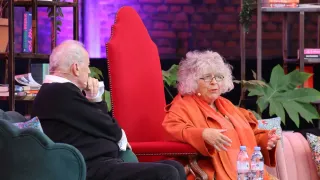
3 hours ago
Ruby Rose Slams "Tradwife" Rumors About Taylor Swift as "Rage Bait"
READ TIME: 3 MIN.
In recent weeks, Taylor Swift has faced mounting online criticism over her new album, The Life of a Showgirl, and her increasingly public relationship with NFL star Travis Kelce. The backlash centers on claims—widely circulated on social media and amplified by commentary in outlets like Jezebel—that Swift’s lyrics, which touch on themes of marriage, family, and stability, suggest a pivot toward traditional “conservative” values often associated with the “tradwife” movement. The term “tradwife” refers to women who embrace traditional gender roles, often as part of right-wing or alt-right ideology, which stands in contrast to the progressive feminist image Swift has cultivated throughout her career.
The speculation was further fueled by Swift’s personal life, particularly her engagement to Kelce and recurring musical references to domesticity. Critics alleged these choices marked a departure from her previous stance as an activist and feminist ally, with some going so far as to suggest an alignment with right-wing politics and MAGA supporters—a claim that quickly gained traction among online detractors.
Amid the escalating debate, Ruby Rose, Australian actress and longtime friend of Swift, took to Threads to unequivocally reject the rumors. In a series of posts, Rose addressed the “rage bait” and “propaganda” being spread online, emphasizing Swift’s history of supporting social justice and progressive causes. Rose stated, “As someone who has spent many nights discussing the world, social injustice and life, with The Show Girl herself, I refuse to say her name in the same sentence as the hate group, Wackadoodles, are conspiring to attach her to”.
Rose continued, “Given her public position against Trump, and his against her. If you are falling for the propaganda ‘Trad wife’ ‘X,y,z’ claims, you are most definitely walking into the biggest man made, rage bait, black hole. Stop it. It’s not true, and it’s incredibly stupid. It’s also embarrassing and hurtful to see energy put into this. Keep that energy and let’s take it where it’s necessary and needed”.
Rose’s defense was rooted in Swift’s well-documented political history. Swift has publicly endorsed Democratic candidates, including Joe Biden in 2020 and Kamala Harris in 2024, and has maintained a vocal stance against former President Donald Trump. In addition, Swift has addressed the backlash herself. On The Scott Mills Breakfast Show, she rejected the idea that marriage would mark the end of her career, calling the suggestion “shockingly offensive”.
The conversation surrounding Swift’s wealth also resurfaced, with detractors questioning her right to billionaire status and the authenticity of her philanthropy. Rose responded directly to these claims, revealing that Swift has a longstanding habit of quietly supporting individuals in need. “She used to scroll GoFundMe like a social media app. Clicking ‘reach their donation’ like the ‘like’ button,” Rose explained, referencing Swift’s pattern of anonymous giving to fundraisers for tuition, rent, and medical bills.
Ruby Rose’s intervention is notable not only for its defense of Swift but also for its resonance within LGBTQ+ communities, where debates about visibility, authenticity, and political alignment often echo broader societal tensions. Rose herself is a prominent LGBTQ+ figure and activist, and her perspective lends additional credibility and nuance to the discussion.
Online speculation about Swift’s “tradwife” image highlights the volatility of internet discourse, especially for high-profile women and LGBTQ+ allies. Accusations of political shifts based on lyrics or personal relationships rarely account for the complexity of identity, activism, and artistic expression. The phenomenon of “rage bait”—content designed to provoke outrage and drive engagement—plays a significant role in amplifying misinformation and polarizing public opinion.
LGBTQ+ advocates have long cautioned against conflating personal choices—such as marriage or expressions of domesticity—with political or ideological shifts. As Rose’s posts suggest, intersectional activism and allyship are not negated by private life choices, and public figures should not be reduced to caricatures or subjected to simplistic narratives.
Rose’s defense has received widespread support among Swift’s fans and LGBTQ+ communities, many of whom view the controversy as emblematic of broader struggles over representation and authenticity in pop culture. Her call to “keep that energy and let’s take it where it’s necessary and needed” has been interpreted as a rallying cry for constructive activism and a rejection of divisive online discourse.
As the debate continues, both Swift and Rose remain steadfast in their advocacy for social justice, philanthropy, and LGBTQ+ rights. The incident serves as a reminder of the importance of critical media literacy and the dangers of rage bait in shaping public perceptions—a lesson with particular resonance for LGBTQ+ communities and allies navigating the complexities of visibility in a polarized digital age.






